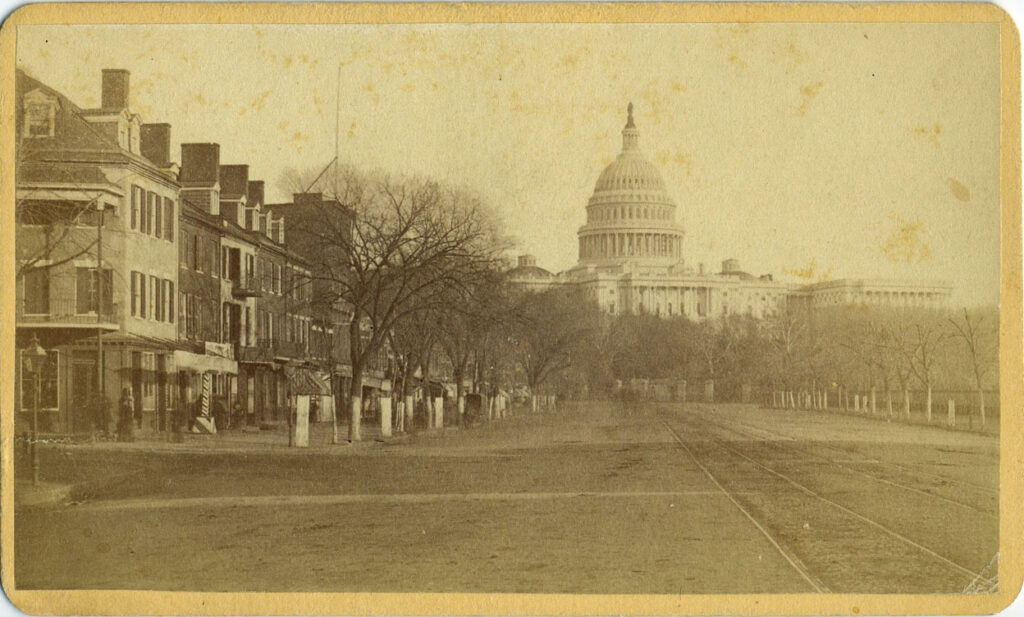Section #20 - Futile attempts to save the Union follow John Brown’s Raid at Harpers Ferry
Chapter 246: The 36th Congress Opens Amidst The Harpers Ferry Turmoil
December 5, 1859
The Opening Tenor Is Set By Members Carrying Firearms
The 36th Congress convenes on December 5, 1859, three days after John Brown is executed in Virginia.

The North-South tension is palpable from the start and threatens to again shift at any minute from violent rhetoric to bodily harm.
One of the most likely perpetrators, James Hammond, the fire-eater Senator from South Carolina, notes in his diary that:
The only persons who do not have a revolver and a knife are those who carry two revolvers.
As usual, the first opportunity for discord lies in the selection of a new House Speaker, this time to succeed James L. Orr of South Carolina, who has retired.
The choice will be made by a total of 237 members across a wide range of party affiliations.
Division Of House Seats In The 36th Congress
| Party | # of Seats |
| Republicans | 113 |
| Mainstream Democrats | 84 |
| Secessionist Democrats | 15 |
| Unionists | 19 |
| Know Nothings | 6 |
| 237 |
February 1, 1860
Democrat Party Divisions Evident In Selection Of A Speaker
The ensuing election will require forty-four ballots cast over an eight week period, and will reveal the deep divisions within the Democratic Party.
The Republican are unified, and, after the first ballot, they line up behind a 36 year old third term congressman, John Sherman of Ohio, an anti-slavery man who has served in 1856 as a Whig on the “Kansas Investigation Committee.” They will stick with him through 39 ballots, when it becomes evident that he cannot win the majority needed.
The Mainstream Democrats throw their initial support behind Thomas Bocock of Virginia, who, ironically, will become Speaker of the Confederate House in 1863. Bocock is already in his sixth term, but proves too polarizing, having earlier praised the caning of Charles Sumner. He reaches 85 votes, but then fades after the eleventh round.
From there the search is on for a compromise candidate at least minimally acceptable to the divisive factions within the party:
- Northerners who have backed Pierce and Buchanan, the Dred Scott decision, and the Pro Slavery Lecompton Constitution.
- The Stephen Douglas loyalists, committed to popular sovereignty, and a re-vote in Kansas.
- The Secessionist Democrats of the South, demanding federal guarantees on slavery, and touting disunion.
- The Unionist Democrats who, like the Know Nothing stragglers, focus on finding a compromise..
Another Virginian, John Milson, peaks at 95 votes on the 17th ballot. More names spring up from there, albeit falling short of Milson’s total. Opposition Party candidate Horace Maynard of Tennessee hits 65 votes on the 23rd round, and the Doughface Ohioan, Clement Vallandingham, garners 69 votes on the 26th. Next up with 88 ballots is Independent Party Texan, Andrew Jackson Hamilton, a Southerner who will eventually side with the Union.
Still, nothing appears promising for the Democrats until the 39th ballot when William N.H. Smith of North Carolina reaches the 112 vote mark on ballot #39. Smith is a conservative Presbyterian, Yale-educated, previously a Whig, both pro-slavery and fiercely pro-Union, although later serving in the Confederate Congress.
Once the Republicans see the tide shifting to Smith, they drop Sherman in favor of William Pennington, the 63 year old ex-Governor of New Jersey who is just beginning his only term in the House.
While opposing the Lecompton Constitution, Pennington is less outspoken on slavery than Sherman and favors compromises to save the Union. On the 44th ballot Pennington achieves the majority 117 votes needed to win, after a futile attempt by the Douglas Democrats to back John McClernand of Illinois.
Round By Round Voting For Speaker Of The House in 1859-60
| 1st | 7th | 11th | 17th | 23rd | 26th | 28th | 31st | 35th | 39th | 40th | 44th | |
| Thomas Bocock (D) – Va | 86 | 86 | 85 | 14 | 2 | 32 | 51 | 1 | 1 | |||
| John Sherman (R) –Ohio | 66 | 96 | 112 | 106 | 101 | 104 | 102 | 105 | 105 | 106 | ||
| Galusha Grow (R) – Pa | 43 | 2 | ||||||||||
| Alex Boteler (D) – Va | 14 | 1 | 21 | |||||||||
| John Milson (D) – Va | 0 | 95 | 4 | |||||||||
| John Gilmer (O) – NC | 3 | 26 | 1 | 6 | 2 | 17 | 19 | 3 | 16 | |||
| Charles Scott (D) – Ca | 3 | |||||||||||
| Clem Vallandingham (D) – OH | 2 | 69 | ||||||||||
| Horace Maynard (O) –TN | 65 | |||||||||||
| Andrew Hamilton (ID) – Tex | 1 | 88 | 4 | |||||||||
| William N.H. Smith (ID) – NC | 26 | 112 | 113 | 4 | ||||||||
| John McClernand (D) – IL | 1 | 5 | 2 | 37 | 85 | |||||||
| William Pennington (R) – NJ | 1 | 115 | 117 | |||||||||
| All Others | 18 | 8 | 11 | 17 | 22 | 16 | 41 | 7 | 26 | 8 | 5 | 11 |
| Total Cast | 230 | 217 | 230 | 225 | 215 | 212 | 216 | 219 | 215 | 229 | 234 | 233 |
| Needed to win | 116 | 109 | 116 | 113 | 108 | 107 | 109 | 110 | 108 | 115 | 118 | 117 |